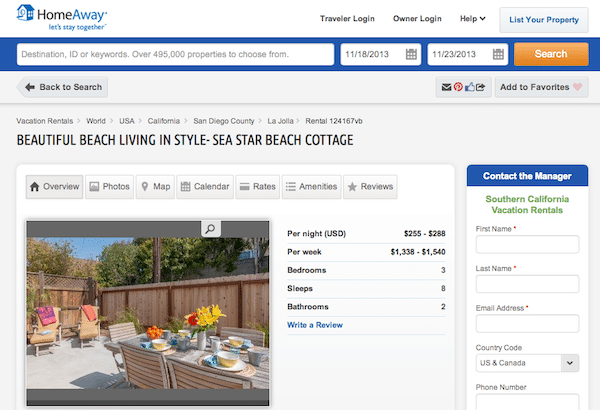Skift Take
The Vacation Rental Management Association doesn't have the digital savvy or clout to forge a new set of business relationships between professional managers on the one hand, and online travel agencies and vacation rental sites such as HomeAway, on the other. Too little, and way too late.
The companies that manage the massive stock of vacation homes in the U.S. and abroad are looking for two things: to figure out a way to inform travelers that their properties are professionally managed, and reduce costs for getting the word out about their properties.
Their trade group, the Vacation Rental Managers Association, has made some progress on showcasing vacation homes as professionally managed, but cutting costs on listings and bookings has so far remained elusive.
Mark McSweeney, who became executive director of VRMA in April, says negotiations with hotel distribution company Pegasus Solutions to build a vacation rental “switch” were “mutually terminated,” and VRMA is currently negotiating with another party.
The idea behind the switch is that vacation rental management companies would contribute their inventory to the association’s switch, which would then distribute the listings to online vacation rental websites such as HomeAway, TripAdvisor/Flipkey, as well as online travel agencies, so the vacation rental companies wouldn’t have to pay individual providers separately.
VRMA concedes it would face the prospect of negotiating a business model not only with the switch technology provider, but also with the vacation rental sites and the OTAs.
The idea, years in the making and coming after a failed multiyear effort to get Pegasus Solutions to be the technology provider, is looking increasingly elusive as VRMA member HomeAway becomes a global vacation rental powerhouse, and has just penned its own deal with Expedia, for example.
HomeAway, Expedia, and Booking.com have the audience and the clout, and if the vacation rental switch ever comes to be, its leverage with the big distributors would be suspect.
The VRMA’s now-failed negotiations with Pegasus date to 2011, and McSweeney says even if the switch never becomes a reality, the process was not a waste of time or resources.
“We don’t think we are behind at all,” says Heather Weiermann, VRMA’s new president, who doubles as chief operating officer of All Star Vacation Homes.
As part of the Pegasus process, VRMA developed standards on brand inclusion in listings, meaning they show the name of the professional management company, as well as rate parity, and normalize definitions of one- and two-bedroom properties, for example, Weiermann says.
That sort of work influenced HomeAway to designate properties when professionally managed by letting travelers “contact the manager” and by displaying the name of the management company in search results, Weiermann says.
A PhoCusWright study, The U.S. Vacation Rental Landscape 2013, found that more than $11.6 billion, which was greater than half of U.S. vacation rental revenue, went to professionally managed properties in 2012, and that 35% of vacationers prefer such properties over rentals by owner.
VRMA wants professionally managed properties to stand out when companies offer them on Airbnb, for instance, so travelers will know they are getting quality service, and not an inconsistent or shoddy experience.
As McSweeney puts it: The VRMA is happy to see the growth of sites such as Airbnb, but it wants to show the differentiation and provide “clarity” when professionally managed properties get listed.
Dwell Newsletter
Get breaking news, analysis and data from the week’s most important stories about short-term rentals, vacation rentals, housing, and real estate.
Have a confidential tip for Skift? Get in touch
Tags: homeaway, tripadvisor, vacation rentals
